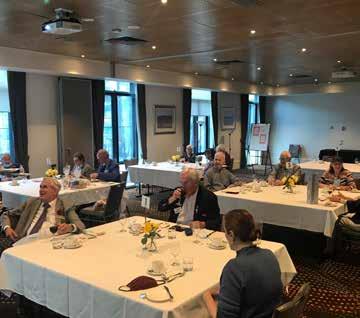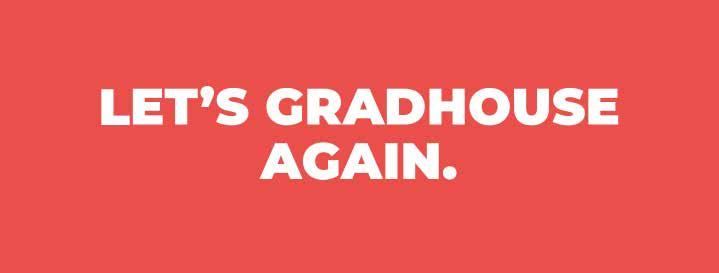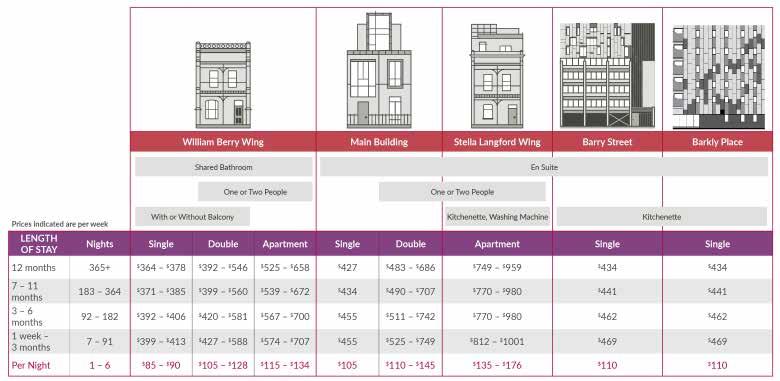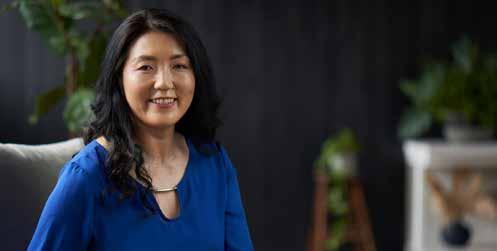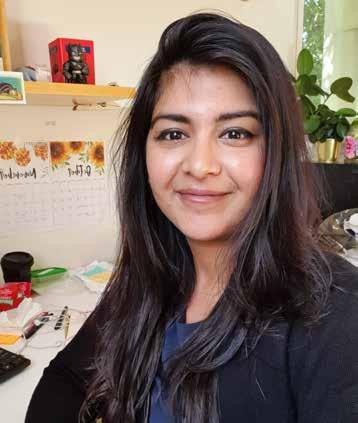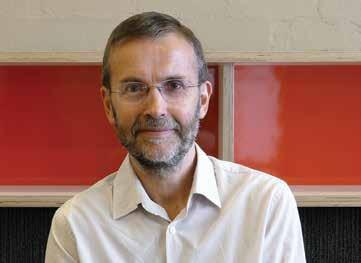
9 minute read
Feature
Alison Bryson
Alison Bryson is currently the Executive Support Officer to the Mission to Seafarers Australia, working with the Regional Director for Australia and Papua New Guinea and the Australian Council of the Mission to Seafarers Inc. on communication, governance and strategy in support of seafarers, the forgotten floating community. In 2010, Alison had a nervous breakdown. She didn’t know people who had breakdowns. She didn’t know what to do with herself being unable to work. She didn’t know if she would recover and be able to live independently again. She just didn’t know. With the help of her husband, parents and others, she recovered and found joy in her life again and wrote a book, Knitting, Tatting and Nervous Breakdowns, about her experience. Alison spoke with us recently via an email interview. * * *
Advertisement
Vital Stats: Name/Qualifications/Accreditations
Alison Bryson, M.A. (Hons) German — Politics, University of Aberdeen, Scotland.
What was your educational background? What did you study at university and why did you choose this course?
I went to school in the small village in the Borders of Scotland where I grew up. I didn’t know what I wanted “to be” (and have always been a little envious of those who did!) and was encouraged by schoolteachers to go to university. I was a ‘first in family’ university student. I chose to study German and Politics out of interest, as well as my mum being a local government councillor and a supporter of campaigning.
What did you learn during your tertiary education — not just academically, but what ideas did you form and what perceptions? Did any of your views change significantly when you went to university?
In addition to learning skills that included reasoning, researching, writing and time management, I learned that community can be on a much larger scale than a small village. I joined the Students’ Representative Council and chose to take the position of Overseas Students Officer. Recognising that everyone, apart from overseas students, left during the Christmas and Easter holidays, I started a programme of parties, bus trips and outings — something quite novel in the late 1980s. It was a fantastic opportunity to meet people from all over the world and to find out about different cultures and ways of life. It reinforced my view that whatever differences there are between us, we’re all people.
What is your earliest memory of having an interest in your field?
While I don’t feel I have a specific discipline field, I’ve always been interested in people and helping to support them. When I was younger, Mum worked in community education in a community centre and I loved visiting during school holidays, helping with the Lunch Club for old age pensioners and meeting other groups that came to the centre.
What has been your pathway since graduating? What was your first job after graduation and how did that job prepare you for your later positions? Any lessons learnt?
After graduating I had a one-year position as a Student Officer at the university. Attending a formal dinner one evening I realised the need for student input into the University’s planning for its 500th anniversary celebrations. I wrote a speculative letter to the Senior Vice-Principal, explaining why I thought a position was needed and why I was the ideal candidate. It worked! I was given a three-month contract that led to a full-time position in university student administration. That post was particularly varied, as the Registrar believed it important to give staff a good grounding in different areas, so I was responsible for tuition fee collection, managing the Student Hardship Fund, assisting with graduations and servicing the Board of Studies in Divinity. I learned the importance of making and taking opportunities where you see them. Since then I’ve worked in university administration in England, Wales and Australia, was the first manager of the General Medical Council’s purpose-built Clinical Assessment Centre in London and managed a Registration Service (of births, deaths and marriages) in south-east England.
Did you have any residencies, internships or anything else that ultimately led you to where you are today?
The Student Officer position was somewhat like a residency and gave me the chance to see how senior members of staff and committees worked. Not many roles give you immediate access to high level discussions at such an early stage in your career. I learned so much about negotiating, public speaking, chairing committees, campaigning, press and public relations and all these things have stood me in good stead in my career.
What are the goals of your company/organisation and what are you ultimately trying to achieve?
My aim in writing and self-publishing Knitting, Tatting and Nervous Breakdowns is to tell the story of my mental health lived experience and to give hope and practical help to others who may be experiencing anxiety and depression, or who may have a relative or friend who is. I didn’t know what was happening to me when I had my breakdown in 2010 and I didn’t know anyone else who had had a breakdown. When I felt helpless, when everything seemed utterly hopeless, it would have meant so much to have been able to look at someone’s face or hear their words and know that they had survived. I want to share my story so that others don’t feel so alone.
Who has been the biggest influence on your life and what lessons did that person teach you?
My mum, dad and gran (who we lived with when I was a child) have all influenced me, particularly as they all had a strong work ethic. My dad taught me about fairness and respect, and my gran about overcoming adversity (she was the eldest of seven children, her mother died in childbirth, her family lost their farm in the Depression and later she was widowed at 51 years old). My mum, who combined two part-time jobs with being a local councillor and heavily involved in other community activities, has a generosity of spirit that is unmatched and taught me that before I’m anything else (daughter, sister, wife, etc.), I’m me — Alison.
What were some of your major milestones?
Professionally, working at a national level for the General Medical Council. I ran the clinical component of the Professional and Linguistic Assessments Board (PLAB) Test for international medical graduates seeking to work in the UK. My earlier work with overseas students helped me understand the cultural differences of our candidates to make sure that their experience was a positive one. I was also involved in the design of a new centre and, when built, managed the move from the initial centre to the new one without any impact on examinations. Personally, meeting and marrying my wonderfully supportive husband, Darrell and surviving my breakdown. It was a horrible, frightening time but it gave me the chance to reflect on how I live my life and the realisation that looking after your mental health is as important as your physical health.
What have you been most proud of in your career?
Professionally, being recognised as someone who has integrity, who tries to help and support others without judgement and who has a good sense of humour! I’m very proud of completing Knitting, Tatting and Nervous Breakdowns. It’s an honest account of what I went through and what I learned. I’m also proud of the feedback I’m receiving — that people
wished the book had been available earlier to help them through dark periods, that it’s a fascinating insight into the UK’s National Health Service and the fabulous support offered by the mental health workers, and that it will be such a comfort for those who are suffering from anxiety and depression, to know that they are not alone and that they will get better.
What are some of the greatest challenges and how did you overcome them?
It was difficult and confronting to remember and write about some aspects of my mental health experience. A friend, realising that I was making myself very vulnerable, asked if I was sure that I wanted to go ahead with the book. She was concerned that I would be trolled or that people would seek support that I wasn’t in a position to give. I didn’t write for three months afterwards, as I wrestled with this. I came to the conclusion that I’m not responsible for how others might react to my book and that I’m not a specialist, just someone who has a lived experience. Then, the most amazing thing happened. We were moving a bookcase and a letter fluttered out of one of the books. I recognised the handwriting as my Gran’s (who sadly passed away in 2016). She had written to me in 1991 when I was living in Germany, writing my dissertation. The first line read, “My dear Alison, I hope this letter finds you well and getting your story written…” It seemed like a sign that I should continue!
What did you develop during this time — professionally and personally — in terms of your ideas, and did they change?
Having gone through my experience, I’ve become more attuned to recognising stress in others. I’m now much more thoughtful in my interactions with people, especially those I’m meeting for the first time.
What is the most important thing that can make you successful at your job?
I don’t think there is one thing that can make you successful, but my experience has taught me how important my health is, to have a strong work ethic and to combine that with a sense of humour.
What are you working on for the future?
I’ve really enjoyed writing and have some ideas for a further book.
What is your next goal? Do you have an ultimate goal that you are working towards?
My goal is to share my story more widely, to add my name and my face to the global mental health story. When I was writing Knitting, Tatting and Nervous Breakdowns, I never imagined that it would be published during a pandemic, when people are experiencing great personal uncertainty around employment and finances and seeking support for anxiety and depression in much greater numbers. I think that the lessons I learned and share in the book have great relevance for these COVID-19 times and as we seek to recover.
What advice would you give graduates?
I’ve listened to lots of graduate addresses throughout my career, but the most important advice that resonated with me was that integrity, once lost, can’t be regained. It’s important to think about proposed actions in relation to integrity.
What do you like doing when you are not working?
I like doing things with my hands, rather than my head — knitting and baking are favourites. I also enjoy tai chi, which I find wonderful for relaxing.
Finally, is there anything else you would like to add?
I’m really proud to work for the Mission to Seafarers in Australia, a not-for-profit organisation that supports seafarers around the world. Ordinarily, we provide transport to our centres, where seafarers have the chance to connect with their families and spend some time away from their vessels. Due to COVID-19, shore leave is largely no longer permitted, but worse, crew changes are not happening either. Contracts are usually nine months long, then relief crew members take over, but due to closed borders, an estimated 400,000 seafarers are trapped working aboard vessels worldwide, with no certainty of when they can leave and see their families. Imagine that. Together with others in charitable organisations, unions and the maritime industry, we’re raising the profile of seafarers, who I call “the forgotten floating community”. * * * Alison’s book, Knitting, Tatting and Nervous Breakdowns, is available here: https://amzn. to/2HUaNvH.

